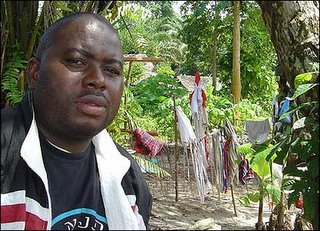Amnesty Protests Against Extra-Judicial Killings In The Niger Delta
 ASARI DOKUBO THE NIGER DELTA REVOLUTIONARY HUMAN RIGHTS ACTIVIST IS CURRENTLY IN DETENTION IN NIGERIA.
ASARI DOKUBO THE NIGER DELTA REVOLUTIONARY HUMAN RIGHTS ACTIVIST IS CURRENTLY IN DETENTION IN NIGERIA.Amnesty has called on the Nigerian government to stop extra-judicial killings in the Niger Delta of Nigeria.
"We haven't seen any extra-judicial executions since...1995 but in terms of other human rights violations the problems are still there," said Ulrika Sandberg, one of the authors of the Amnesty report.
If Amnesty says it has not seen extra-judicial executions since 1995 does not mean that there were no judicial executions in Nigeria. What Amnesty should say is that Amnesty is ignorant of any extra-judicial executions. Because, extra-judicial executions of over 1,000 civilians have been reported since 1999 to date. And most of them were done with the full knowledge of the ruling authorities of the present government of Nigeria. Even cases of massacres of innocent Nigerians have been witnessed in the Niger Delta region of Nigeria. And Amnesty has done nothing more than make statements in order to justify it's existence and collect more funds to continue it's work as the toothless watchdog of human rights.
I am not interested in toothless watchdogs that cannot protect the helpless people they are meant to guard.
When Amnesty begins to sue Tyrannical corporations, governments,institutions and the draconian rulers found guilty of the violations of human rights, then I would be convinced that Amnesty is truly active and proactive not only in whistle-blowing, but in the prosecution of crimes against humanity in Nigeria and other parts of the world like in Indonesia where Islamic terrorists have been killing innocent Christians and only recently three Christian girls were beheaded by Islamic terrorists in Indonesia. And what is Amnesty doing about it?
Read the news report below.
Nigeria must end army killings in oil delta-Amnesty
03 Nov 2005 00:01:10 GMTSource: Reuters
By Estelle Shirbon
ABUJA, Nov 3 (Reuters) - Nigerian security forces protecting oil industry interests in the southern Niger Delta kill local people and raze villages with impunity, human rights group Amnesty International said in a report published on Thursday.
Amnesty accused the government of ignoring the army's abuses and failing to tackle the poverty and injustice it said were the root causes of frequent unrest in the delta.
Nigeria is the world's eighth oil exporter and the bulk of its 2.4 million barrels per day output comes from the delta.
"Despite a return to civilian government in 1999, those responsible for human rights violations under military governments have not been brought to justice," Amnesty said.
"The security forces are still allowed to kill people and raze communities with impunity," it added.
It called on the government to set up independent inquiries into abuses in the area, including a raid by security forces in February on the village of Odioma. It said at least 17 villagers were burnt or shot to death in the raid, two women were raped and 80 percent of homes were razed.
The human rights group said foreign oil companies, as partners of the Nigerian state in exploiting the delta's oil resources, bore a share of responsibility for the poor human rights situation in the region and should do more to improve it.
Most of the 20 million people in the delta, a maze of swamps and mangrove creeks, live in poverty with no basic services.
Many resent the oil industry which, as they see it, has wrecked their environment and generated enormous profits from their lands, but yielded few benefits for them.
This sense of injustice breeds frequent protests at oil facilities as well as sabotage, theft of crude, kidnappings of oil workers and conflicts between communities.
VILLAGE RAID
The report highlights the Odioma raid and another incident in February in which soldiers fired on protesters at an oil terminal operated by Chevron
The protesters had entered the facility to show their anger at what they saw as unfulfilled promises from Chevron of jobs and development for their community.
Amnesty said these examples demonstrated that the human rights situation in the delta has not improved in the 10 years since environmental and human rights activist Ken Saro-Wiwa and eight others were hanged by the government.
The hangings in November 1995, under military dictator Sani Abacha, caused an international outcry and Nigeria became a pariah state. In 1999, a civilian government took power after 15 years of army rule and Nigeria, Africa's most populous country, has since regained respectability.
"We haven't seen any extra-judicial executions since...1995 but in terms of other human rights violations the problems are still there," said Ulrika Sandberg, one of the authors of the Amnesty report.
"We're aware of a few initiatives by the government and by companies to address the human rights situation but we've seen very few effects on the ground," she told Reuters.
Comments